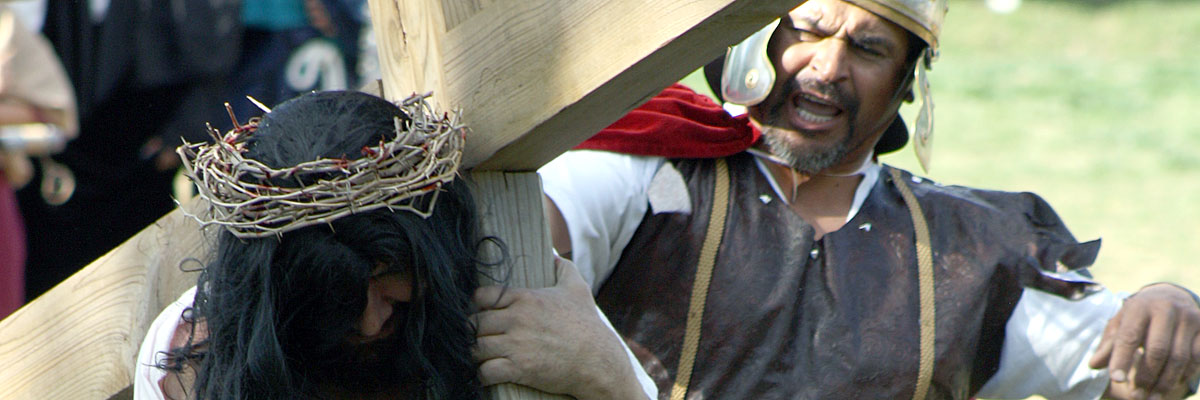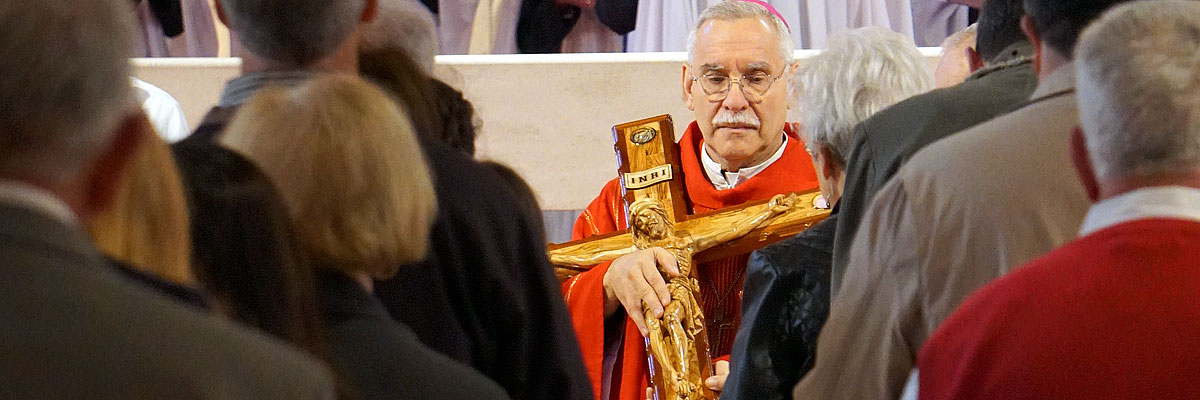Official Website of the
Catholic Diocese of Little Rock
Good Friday Passion of the Lord 2015
Published: April 3, 2015
Bishop Anthony B. Taylor preached the following homily at the Cathedral of St. Andrew in Little Rock on Friday, April 3, 2015.

Bishop Taylor
Rosh Hashanah, Passover and Yom Kippur are the three holiest days of the Jewish year. Christmas is our Rosh Hashanah, except that we celebrate the beginning not merely of a new year, but rather the beginning of a whole new era of salvation. Easter is our Passover, except that we celebrate freedom not merely from slavery to an earthly Pharaoh, but rather freedom from slavery to Satan, freedom from the tyranny of sin and death.
And Good Friday is our Day of Atonement, our Yom Kippur, the day Jesus died to atone for our sin. Rosh Hashanah, Passover and Yom Kippur pointed forward to the new era of fulfillment in which Jesus would break the power of Satan and atone for all sin.
In biblical times people atoned for sin on Yom Kippur by means of two goats that served as their substitute and were made to suffer for them and in place of them. The first goat was killed for the people to atone for their individual sins; its blood was poured out on the altar in the Temple.
The tomb in which we bury him today will soon become the womb from which you and I will be reborn in baptism to share the fruits of Jesus' Easter victory.
The second goat was the scapegoat that was made to suffer in place of the people, to atone for the collective sins of the nation. The High Priest confessed the nation's sins over this goat and then took it outside the city, where he released it to wander aimlessly until predators got it. It was called the scapegoat because it was allowed to escape into the desert.
Well on Good Friday Jesus suffered and died not only for us but also in place of us. Like the first goat, he was killed for us to atone for our individual sins; his blood was poured out on the altar of the cross. And like the scapegoat, Jesus was led outside the city to die a lonely, agonizing death at the hand of predators in atonement for the collective sin of the whole world.
But the difference was that since goats have no life beyond the grave, Yom Kippur had to be repeated every year, and no one knew for sure whether using those goats as their substitutes actually accomplished the atonement that the people sought. By contrast, since God is the eternal and Jesus is God who freely chose to suffer for us and act as our substitute, there can be no doubt that the atonement he accomplished was permanent and effective.
Isaiah prophesied Jesus' substitutionary atonement for our sins in today's first reading, as follows: "It was our infirmities he bore, our sufferings he endured ... he was pierced for our offenses, crushed for our sins; upon him was the chastisement that makes us whole, by his stripes we were healed ... the Lord laid on him the guilt of us all ... he was silent and opened not his mouth ... smitten for the sin of the people ... through his suffering he shall justify many and their guilt he shall bear ... he shall take away the sins of many and win pardon for their offenses."
On Good Friday, Jesus became our substitute: our sin offering and our scapegoat. He didn't just suffer and die for us; he suffered and died in place of us. But thanks be to God, the tomb in which we bury him today will soon become the womb from which you and I will be reborn in baptism to share the fruits of Jesus' Easter victory: redeemed from our slavery to sin, sharing in the eternal life his death has won for us today. By his wounds we were healed!
On Good Friday, Jesus became our substitute; our sin offering and our scapegoat. He didn't just suffer and die for us, he suffered and died in place of us. But thanks be to God, the tomb in which we bury him today will soon become the womb from which you and I will be reborn in baptism to share the fruits of Jesus' Easter victory — redeemed from our slavery to sin, sharing in the eternal life his death has won for us today. By his wounds we were healed.







